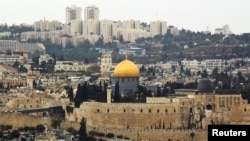Video surveillance of Jerusalem's holiest site was meant to be a quick fix to lower tensions that have driven months of Israeli-Palestinian violence, but disputes over who controls the footage and what the cameras may or may not film are holding up the project.
Underlying the seemingly technical arguments is a fundamental disagreement over who is in charge of the 37-acre (15-hectare) walled hilltop shrine, which is central to the competing national and religious narratives of Israelis and Palestinians, Muslims and Jews.
This rivalry is at the heart of the Israeli-Palestinian conflict and has repeatedly sparked violence.
"There is no gimmick to solve this, full stop,'' said Daniel Seidemann, an expert on Jerusalem affairs and advocate for coexistence. "No mechanism, whether it's a procedure, a camera, a technique, whatever, can survive the bad faith of the parties.''
Any delay in defusing tensions is potentially costly. Major Jewish holidays are typically a time of heightened friction, bringing larger numbers of Jewish visitors to the Muslim-run site, and the next Jewish holiday, Passover, is just two months away.
Jordan, the custodian of the shrine, says the camera project is moving forward, but that it's still in the phase of technical preparations.
The latest round of violence at the site known to Muslims as Haram as-Sharif and to Jews as the Temple Mount erupted in September. Clashes between Palestinians and Israeli security forces quickly led to unrest elsewhere in Jerusalem, across Israel and in the West Bank.
Since then, 28 Israelis have been killed in Palestinian stabbings and other attacks. At the same time, 166 Palestinians have been shot dead by Israeli security forces and civilians, including 119 said by Israel to have been attackers.
U.S. Secretary of State John Kerry announced the video surveillance plan during an October visit to Jordan, which administers the Haram as-Sharif, Islam's third holiest site and home of the Al-Aqsa and Dome of the Rock mosques.
At the time, Kerry praised video broadcasts from inside the compound as a "game-changer.'' He said the idea had been proposed by Jordan's King Abdullah II and endorsed by Israeli Prime Minister Benjamin Netanyahu.
Details were to be worked out between the Israelis and the Jordanians, and officials suggested the cameras would be installed in a matter of weeks. But major sticking points quickly emerged.
Israel wants surveillance inside Al-Aqsa, arguing that this would expose Palestinians hoarding stones and firecrackers in the mosque for clashes with Israeli security forces.
Jordan wants the cameras to only show the outdoor areas of the compound, including large plazas around the two mosques. Jordan's king said in November that "there will be no cameras inside the mosque.'' He gave no reason, but Palestinians have said they fear Israel will use the footage to spy on activists.
Footage of the outdoor areas could potentially expose violations by Jewish visitors, who under existing arrangements are allowed to visit the site, but not to pray there.
Jewish visitors, accompanied by Israeli police and Muslim religious guards, usually walk around the outdoor areas in groups, but do not enter the mosques. Those suspected of praying, including by swaying back and forth in a manner typical of devout Jews, are escorted out of the compound.
The Temple Mount is the holiest site in Judaism, located on the spot where the biblical Temples once stood. Jewish worship takes place at the neighboring Western Wall, the remnant of a retaining wall of the Temple, under arrangements in place since Israel captured Jerusalem's Old City, along with the rest of the eastern sector, the West Bank and Gaza Strip, in 1967.
Israel and Jordan have close but quiet relations in other areas, such as security coordination against Islamic extremists. Israeli and Jordanian officials would not comment on the record about the cameras, presumably not wanting to upset the delicate ties between the countries.
Officials familiar with the talks said the differences over the cameras have been difficult to resolve.
"We remain committed to a solution that gives total transparency,'' said a senior Israeli official when asked if Israel insists on having cameras inside the mosque. "We believe provocations can be exposed when they happen, and it can be clear what side they are coming from.''
Israel also wants video footage to refute repeated Muslim allegations of Israeli plans to partition the compound, as was done at another contested holy site in the West Bank city of Hebron more than 20 years ago, said the official, who spoke on condition of anonymity because he was not authorized to discuss the issue with the media.
Growing numbers of nationalist Jews have been visiting the compound in recent years, including prominent members of Netanyahu's government, fueling the Muslim fears. The Netanyahu government has denied it has such intentions.
Azzam Khatib, in charge of Jordanian-run Muslim endowment, or Waqf, which is in charge of the mosque compound, said the surveillance cameras should be managed by Muslim authorities "without interference from the Israelis.''
"As the king has said, there will be a control room for the cameras under the sole responsibility of the Waqf, and the images will be broadcast to the world through the Internet around the clock,'' said Khatib, a Palestinian.
Earlier this month, Jordanian minister of religious affairs Hayel Daoud said technical teams are still conducting studies. "The installation of cameras was and still is a Jordanian demand, and not an Israeli one,'' he told the Al-Ghad newspaper.
Control of the footage is another contested issue, the Israeli newspaper Haaretz reported this month. It said Jordan and the Palestinians balk at the idea of allowing Israel to pause or edit the video transmissions.
The video surveillance issue was raised in meetings in Jordan last weekend between Kerry and Abdullah, the U.S. State Department confirmed.
There was no word on whether anything was resolved.
Disputes Delay Video Surveillance at Tense Jerusalem Shrine

JERUSALEM —



